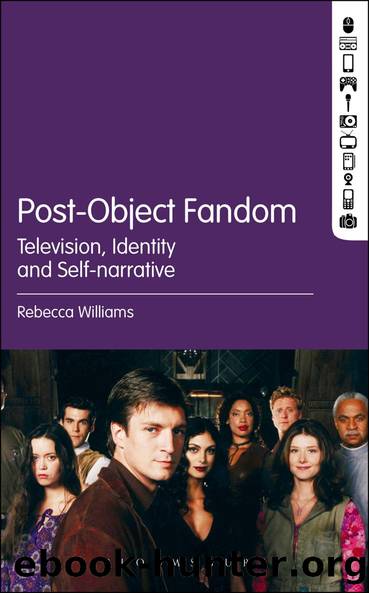Post-Object Fandom by Rebecca Williams

Author:Rebecca Williams [Williams, Rebecca]
Language: eng
Format: epub
Tags: Performing Arts, Television, History & Criticism, Guides & Reviews, Social Science, Media Studies
ISBN: 9781501319983
Google: UkqvDAAAQBAJ
Publisher: Bloomsbury Publishing USA
Published: 2016-07-28T03:33:16+00:00
Conclusion
For these fans of Lost and The West Wing, discourses of anti-fandom are used to articulate a sense of rejection at the end of the series. They are those who have, at other times, occupied the role of more appreciative and positive fans, highlighting that âanti-fans must find cause for their dislike in something. This something may vary from having previously watched the show and having found it intolerable; to having a dislike for its genre, director or stars; to having seen previews or ads, or seen or heard unfavourable reviewsâ (Gray 2003, 71). These posters exemplify fans who have become dissatisfied with certain aspects of the show (e.g. the writers, the storylines) and who have chosen to occupy positions of anti-fandom that are âperformed with close knowledge of the text and yet be devoid of the interpretive and diegetic pleasures that are usually assumed to be a staple of almost all media consumptionâ (Gray 2005, 842). This intimate knowledge of specific shows is highlighted by the fact that, while rejection can be seen across the two fandoms examined here, the discourses of dislike and anti-fandom are specific to each show. Thus, while West Wing fans were conscious of a split between the personal and political aspects of the show and Lost fans appeared to share a similar concern regarding the character and mystery division of their show, the latterâs issues around narrative premeditation were the most pronounced. This may well be an issue of genre â Lostâs borrowings from fantasy and science-fiction and its status as a âcult blockbusterâ series (Abbott 2009) always set up mysteries that it promised to resolve, whereas The West Wingâs political drama never offered such complex enigmas to its audience. However, it does demonstrate that disparate fan cultures may share broad axes of distinction and rejection, even if these are closely linked to the different implied promises set up by the producers of favourite fan objects. In the case of Lost, such disappointment did not necessarily diminish over time; in 2013, Lostâs Damon Lindelof shut down his Twitter account, allegedly in response to the ongoing negative tweets he received about the series finale (OâBrien 2013). This was, apparently exacerbated by the ending of Vince Gilliganâs drama Breaking Bad, which was widely heralded as the âright wayâ to end a series; disgruntled Lost fans bombarded Lindelof with tweets critiquing the ending of that programme. As Lindelof (2013) himself noted, âmy Twitter feed was pretty much a unanimous run of, âDid you see that, Lindelof? Thatâs how you end a showââ.
The ongoing consternation over Lostâs finale and the responses of many West Wing fans suggest that it is important to consider how some fans may, rather than displaying sadness or grief, demonstrate pleasure or relief at the end of once-beloved television shows and that they might work to distance themselves from their fandom. Furthermore, this allows broader understandings of anti-fandom and how it operates across fandoms at different times. If, indeed, âIn the context of television
Download
This site does not store any files on its server. We only index and link to content provided by other sites. Please contact the content providers to delete copyright contents if any and email us, we'll remove relevant links or contents immediately.
The European Opportunity by Felipe Fernández-Armesto(569)
The European History Highway: A Guide to Internet Resources by Dennis A. Trinkle Scott A. Merriman(535)
Morgan Kaufmann Digital Watermarking and Steganography by Ingemar Cox Matthew Miller Jeffrey Bloom Jessica Fridrich Ton(528)
The Seven Wonders of the Ancient World by Michael Denis Higgins(521)
Hyperculture by Byung-Chul Han(509)
European Security in a Global Context by Thierry Tardy(505)
European Security without the Soviet Union by Stuart Croft Phil Williams(505)
The Routledge companion to Christian ethics by D. Stephen Long Rebekah L. Miles(498)
Get Real with Storytime by Julie Dietzel-Glair & Marianne Crandall Follis(443)
Hudud Al-'Alam 'The Regions of the World' - a Persian Geography 372 A.H. (982 AD) by V. V. Minorsky & C. E. Bosworth(436)
Gorbachev And His Generals by William C. Green(428)
Tibetan Studies in Comparative Perspective by Chih-yu Shih Yu-Wen Chen(427)
Governance, Growth and Global Leadership by Espen Moe(418)
How Languages Are Learned 5th Edition by Patsy M Lightbown;Nina Spada; & Nina Spada(407)
CliffsNotes on Fitzgerald's The Great Gatsby by Kate Maurer(400)
The Oxford History of the World by Fernández-Armesto Felipe;(388)
The Egyptian Economy, 1952-2000 by Khalid Ikram(379)
Oral Poetry and Narratives from Central Arabia: The Poetry of Ad-Dindan : A Bedouin Bard in Southern Najd (Studies in Arabic Literature, Vol 17) (English and Arabic Edition) by P. M. Kupershoek P. Marcel Kurpershoek(365)
The Oxford Handbook of the Incas by Sonia Alconini(364)
